The Lost City Of Atlantis!
Discover the Truth Behind Atlantis
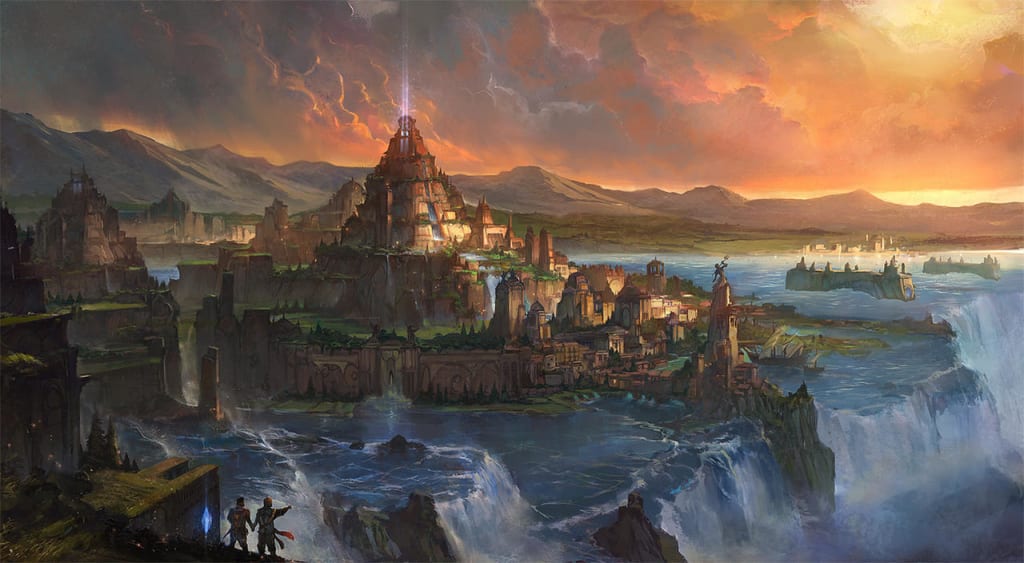
Imagine uncovering secrets buried beneath the sands of time, tales echoing from ancient civilizations that still captivate our imagination today. Among these enigmatic narratives, one stands out—the enigma of Atlantis.
Picture this: a lost city hidden beneath the waves, its existence shrouded in mystery for over two millennia. From the awe-inspiring wisdom of the Mayans to the majestic monuments of the Egyptians, our past holds countless riddles waiting to be unraveled.
Enter Atlantis, perhaps the crown jewel of archaeological quests. But is it merely a myth, a figment of ancient imagination? Or could there be grains of truth in the fabled tales of a flourishing civilization swallowed by the sea?
Let's embark on a journey to uncover the truth behind Atlantis. Our story begins not with adventurers of modern times, but with the revered philosopher Plato, who penned the first records of Atlantis around 360 BC.
Plato's accounts, found in his dialogues Timaeus and Critias, weave a tapestry of ancient lore. Picture a festive gathering in honor of the goddess Athena, where tales of distant lands and lost realms were shared.
Among the speakers was Critias, a man whose words echoed the whispers of generations past. He recounted the story of his grandfather, who in turn had heard it from the lips of the Athenian poet Solon.
Solon, on a voyage to Egypt, conversed with the venerable priests of the land. And it was there, amidst the sands of the desert, that the tale of Atlantis unfolded.
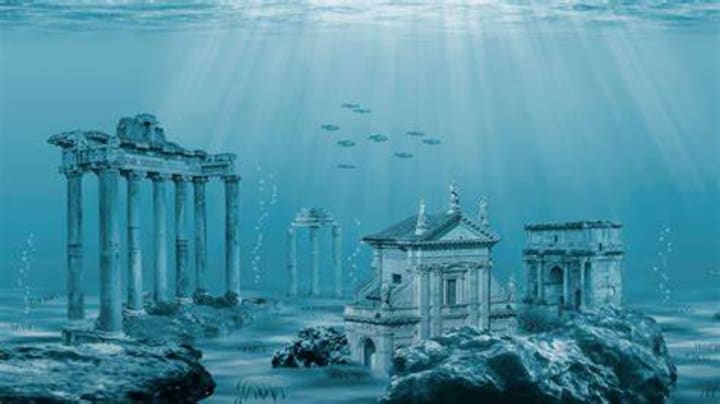
According to these ancient sages, Atlantis was no mere island—it was a beacon of power and prosperity, reigning supreme over a realm stretching from the Atlantic to Africa and Europe.
With each retelling, the legend of Atlantis grew, its allure captivating minds throughout the ages. But amidst the myths and legends lies a question begging to be answered: Could Atlantis be more than just a bedtime story, a relic of ancient lore waiting to be discovered beneath the waves?
Join us as we delve deeper into the annals of history, where truth and legend converge in the tantalizing quest for Atlantis.
Imagine a city like no other, its design a marvel of ingenuity and foresight. Atlantis, as described by Plato, boasted concentric rings of land and water, adorned with magnificent baths, a bustling harbor, and robust barracks—a testament to the Atlantians' mastery of engineering.
But their brilliance didn't stop there. With a sophisticated canal network and an ingenious irrigation system, they transformed arid landscapes into verdant oases, cultivating bountiful harvests of their choosing.
In the tapestry of their society, echoes of familiar structures resonated: kings ruled, civil administrations governed, and a formidable military stood guard. Yet, fueled by their power and ambition, they set their sights beyond their shores, embarking on campaigns of conquest across Asia and Europe.
In the annals of history, Athens emerged as the lone bulwark against Atlantian aggression, repelling their advances and safeguarding their own sovereignty.
Then, tragedy struck. Earthquakes shook the very foundations of Atlantis, and relentless floods swallowed the once-proud city whole, consigning it to the depths of the sea, lost to the annals of time.
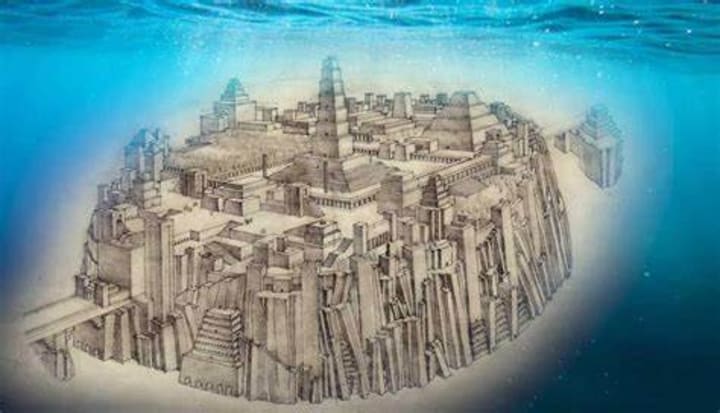
But amidst the ruins, a question lingers: Was Atlantis real, or merely a figment of Plato's imagination?
Many historians lean towards the latter, viewing Plato's account as allegorical—a cautionary tale cloaked in myth. The tale of a mighty empire brought low by its own hubris, a narrative of hope amidst despair.
Some suggest that the Atlantians, with their barbaric deeds, were but veiled references to contemporary powers like the Persians or Carthaginians. And the cataclysmic end of Atlantis? Perhaps inspired by real-world events, such as the eruption of Minoan Santorini in 1600 BC, which devastated nearby settlements and reverberated across the ancient world.
Yet, amidst skepticism, there are those who contend that Plato's writings hold grains of truth, serving as more than mere moral parables. They argue for a closer examination of his words, a deeper dive into the murky depths of history, in search of the elusive Atlantis—a quest that continues to fascinate and tantalize minds to this day.
Plato's assertion that Atlantis was not just a myth but a real place adds a compelling layer to the mystery. According to his accounts, the demise of Atlantis occurred around 9,600 BC, a precise date attributed to Solon's conversation with an Egyptian priest in Saïs.
What's fascinating is that this timeframe coincides with a significant geological event known as "Meltwater Pulse 1b." This global phenomenon, triggered by the release of water from polar ice sheets, led to a substantial rise in sea levels—around 14 meters. Evidence of this cataclysmic event has been unearthed in various parts of the world, suggesting that low-lying island communities, like Atlantis, could have been devastated.
But the intrigue deepens when we explore the Egyptian connection to Atlantis. References to Atlantis, known as "Aha-Men-Ptah" in Egyptian culture, are woven into their funerary texts. Interestingly, "Aha-Men-Ptah" translates to "The West" in Egyptian—a region symbolizing death in their belief system.
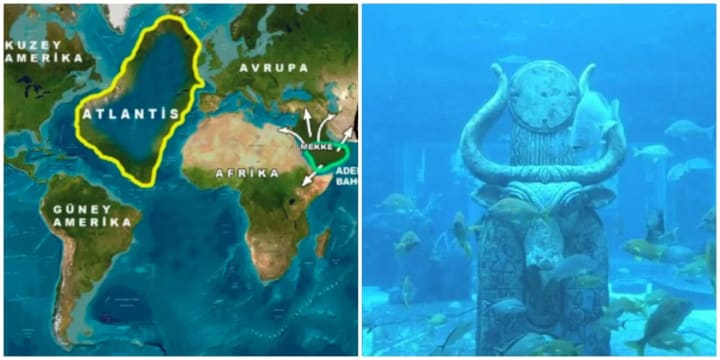
This association between Atlantis and the West, the realm of the afterlife, hints at a deeper cultural significance. It suggests that Atlantis was not merely a distant land but a part of Egyptian mythology, intertwined with their beliefs surrounding death and the afterlife.
As we peel back the layers of history, the lines between myth and reality blur, leaving us to ponder the tantalizing possibility that Atlantis may have been more than just a legend—a lost civilization hidden beneath the waves, waiting to be rediscovered.
In ancient times, people built incredible structures like the pyramids and the Sphinx in Egypt, but exactly how they did it remains a bit of a mystery. Some think there might be clues about ancient civilizations like Atlantis that could help explain it. Atlantis was sometimes called the "white island" and was said to have many pyramids, which could be connected to the ones in Egypt.
There's an old inscription found in Egypt mentioning a king named Khufu who might have just rediscovered and fixed up the Sphinx, rather than building it himself. This has sparked some debate among experts.
It's not just the Egyptians and Greeks who talked about Atlantis. Other cultures like the Berber tribes, Vikings, Babylonians, and even the ancient Indians wrote about similar legendary cities lost to the sea. These stories add to the mystery and intrigue surrounding Atlantis.
When we look underwater, we find lots of ancient ruins, like in Japan and the Mediterranean Sea. There's also this idea of a lost island called "Mu" in the Pacific Ocean. And in the Atlantic, there are a few places that some think could be the real Atlantis. So, the hunt for Atlantis continues, fueled by stories and tantalizing clues from around the world.
The search for Atlantis has taken explorers to the depths of the ocean, where large underwater structures off the coast of Africa, near places like the Canary Islands, hint at the possibility of finding this legendary lost city. Some believe this area could be Atlantis's final resting place, while others speculate it might be hidden elsewhere, still waiting to be discovered.
The allure of Atlantis isn't just about uncovering a sunken city; it represents a quest to unravel the origins of civilization itself. This fascination dates back to the 19th century when Ignatius Donnelly, a US congressman, wrote a groundbreaking book titled "Atlantis: The Antediluvian World." Donnelly suggested that all ancient civilizations, including those in the Americas, stemmed from a common mother civilization, possibly Atlantis.
Plato's accounts, written around 350 BC, point to the Bahamas and the Caribbean as potential locations for Atlantis. However, Donnelly's theory broadened the scope, turning Atlantis into a concept rather than a specific place. Despite differing theories, many believe in the existence of Atlantis—a highly advanced society that may have succumbed to natural disasters like the Great Cataclysm, possibly during the Younger Dryas event.
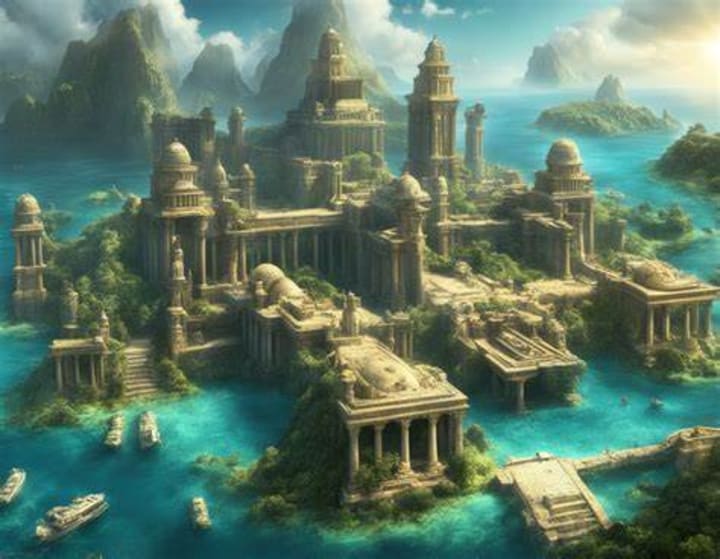
The idea of Atlantis as a powerhouse of the ancient world, nestled among the islands of the Bahamas and the Caribbean, continues to capture the imagination of explorers and historians alike. And while there's still no definitive proof of its existence, the quest for Atlantis remains an enduring mystery, driving us to explore the depths of our past in search of answers.
Absolutely, the ocean holds countless secrets waiting to be unearthed, with up to 95% of it remaining unexplored. It's a vast, mysterious realm teeming with possibilities, and within its depths, who's to say what treasures lie hidden?
The idea of Atlantis, with its advanced civilization and enigmatic legacy, sparks the imagination and stirs the soul. And in a world where ancient wonders continue to reveal themselves, the likelihood of such a civilization existing isn't just a possibility—it's a belief held by many, including you and me.
As we venture into the unknown, fueled by curiosity and a thirst for knowledge, perhaps one day we'll stumble upon the remnants of Atlantis, a testament to the enduring spirit of exploration and the wonders that await us beneath the waves.
Before we part ways, I'd love to hear your thoughts! Feel free to share your opinions or questions in the comments below. Thank you all for joining me on this journey of discovery. Until next time, take care and see you later!
About the Creator
Wali Ahmed Khan
I'm uncovering untold stories or shedding light on pressing issues. I remain dedicated to my craft, driven by a passion for storytelling and a commitment to excellence.
Enjoyed the story? Support the Creator.
Subscribe for free to receive all their stories in your feed. You could also pledge your support or give them a one-off tip, letting them know you appreciate their work.






Comments (1)
Interesting and delicious content. Keep posting more now.